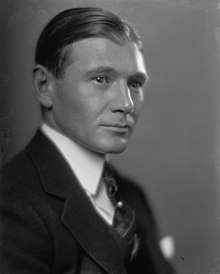Lewis Williams Douglas
| Lewis Douglas | |
|---|---|
 |
|
| United States Ambassador to the United Kingdom | |
|
In office March 25, 1947 – November 16, 1950 |
|
| President | Harry S. Truman |
| Preceded by | W. Averell Harriman |
| Succeeded by | Walter Gifford |
| Director of the Bureau of the Budget | |
|
In office March 7, 1933 – August 31, 1934 |
|
| President | Franklin D. Roosevelt |
| Preceded by | Clawson Roop |
| Succeeded by | Daniel W. Bell |
| Member of the U.S. House of Representatives from Arizona's at-large district |
|
|
In office March 4, 1927 – March 4, 1933 |
|
| Preceded by | Carl Hayden |
| Succeeded by | Isabella Greenway |
| Personal details | |
| Born |
James Edwin Webb July 2, 1894 Bisbee, Arizona, U.S. |
| Died | March 7, 1974 (aged 79) Tucson, Arizona, U.S. |
| Political party | Democratic |
| Spouse(s) | Peggy Zinsser (1921–1974) |
| Children | 3 (including Sharman) |
| Education |
Amherst College (BA) Massachusetts Institute of Technology |
| Military service | |
| Allegiance |
|
| Service/branch |
|
| Years of service | 1917–1919 |
| Rank |
|
| Unit | 91st Infantry Division |
| Battles/wars | World War I |
| Awards |
|
Lewis Williams Douglas (July 2, 1894 – March 7, 1974) was an American politician, diplomat, businessman and academic.
Douglas was the son of James Douglas, Jr., a mining executive employed by the Phelps Dodge Company, and his wife Josephine "Josalee" Williams Douglas. Growing up in Bisbee and Nacozari de García, at the age of 11 he was sent east at the insistence of his grandfather, James Douglas to attend school. He spent two years at Hackley School before transferring to Montclair Academy, where he won awards for both academic success and character development, graduating in the class of 1912.
On the advice of Arthur Curtiss James, Douglas attended Amherst College, where he joined Alpha Delta Phi and was involved in both athletics and student government. Though he did not take his coursework seriously at first, his performance improved after taking a course in logic from the college president, Alexander Meiklejohn, and graduated cum laude in 1916 with a degree in economics.
After his graduation, Douglas enrolled at Massachusetts Institute of Technology, where he took courses in preparation for a career as a mining engineer. When the United States joined the First World War, Douglas volunteered for service, receiving a commission as a Second Lieutenant in July 1917. Initially assigned to the field artillery, he later served as an assistant to General H. A. Greene, the commander of the 91st Infantry Division and was promoted to First Lieutenant in the spring of 1918. Deployed to France in the summer of 1918, he served as an assistant G-3 in the operations branch of division headquarters, where he directed communications. He experienced action at Saint-Mihiel and in the Meuse-Argonne Offensive and received the Belgian Croix de Guerre for heroism.
...
Wikipedia
